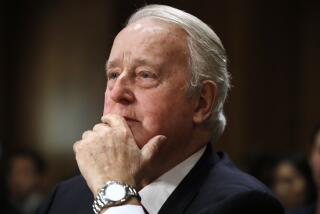Canadaâs Prime Leader Becomes Prime Target
TORONTO â Ronald Reagan has company in Canada. As the U.S. Administration struggles to maintain some sense of order and the appearance of carrying on with business, the American Presidentâs long-time friend and strongest supporter among foreign leaders, Canadian Prime Minister Brian Mulroney, is choking on his own crisis, one so severe that his government has all but stopped functioning.
Even though Mulroney took office 2 1/2 years ago with the largest parliamentary majority in Canadian history, he has suffered a steady decline in popularity through a combination of indecisive leadership and a growing public feeling of distrust, brought about by a series of scandals that have resulted in the resignations of six Cabinet ministers.
Until now, Mulroney, unpopular as he was politically, had escaped any personal taint from the various misdeeds and suspected conflicts of interest that the news media are calling the governmentâs âsleaze factor.â Now, however, he has been accused on the floor of the House of Commons of personally trying to abort a civil lawsuit against a close friend and official adviser, by threatening to cut off government business with the man who filed the court action.
Mulroney has denied such a role, although he has acknowledged talking by phone with an attorney for the man who filed the suit.
But the searing political heat generated by this newest charge, combined with the perception of ineptitude and incompetence, create an atmosphere of near-panic in the capital at Ottawa. For the first time since he took over the government, there are serious thoughts that Mulroney may be forced to resign.
âIâve never seen anything like it,â Joe OâDonnell, a veteran political writer for the Toronto Star, said. He claimed that Parliament is âdominated by Mulroneyâs scandals. The prime ministerâs office is totally preoccupied by damage control and is fully demoralized and so is the caucusâ--the 208 members of Mulroneyâs Progressive Conservative Party sitting in the House of Commons.
A ranking official in the Mulroney government agreed, adding that âno serious business is being carried on. Everyone here is hunkered down. The fear is not that we canât get our program carried out. What theyâre worried about is Mulroney having to quit.â
Because of his overwhelming majority, Ottawa expected Mulroney to stay in power through the five years of a full term. But more and more politicians, journalists and government officials now consider the possibility of his quitting to be quite real if not yet quite likely.
Opponents may believe that they can push him to resign and they attack Mulroney as hard as they can. The problem is not so much that the prime minister has abandoned his agenda, although some ambitious projects are not heard of much these days, but that preoccupation with defending himself is taking so much time that neither he nor his aides are doing the work necessary to advance legislation.
A recent public-opinion poll was one sign of how poisoned is the current atmosphere: It showed that two-thirds of Canadians think Mulroney is mismanaging the economy, an amazing view since by any normal measures--industrial growth, unemployment, inflation--he has brought about major improvement.
âThe government is so vulnerable,â OâDonnell explained, âthat Mulroney is being blamed for doing badly when in reality he is very successful. Everyone is attacking him on issues that would otherwise be ignored.â
For instance, a recent innocuous agreement with France over North Atlantic fishing rights exploded into political bloodletting when the premier of Newfoundland complained that he had not been fully consulted in advance. In the past, this would have been viewed as a local problem and quickly smoothed over. But in the current climate, Mulroney has been formally condemned by nine of the countryâs 10 premiers and has been attacked by the opposition as if he had sold Newfoundland to the French, not simply negotiated what is really a technical arrangement for sharing catches.
Mulroneyâs concern about simple political survival also has damaged his relations with President Reagan, whom the prime minister once called his best friend. As his political fortunes have sunk, Mulroney has been increasingly given to anti-American sloganeering, recently attacking U.S. Trade Representative Clayton K. Yeutter for âunforgiveable ignoranceâ because he questioned a Canadian position in free-trade talks between Washington and Ottawa.
The growing crisis has turned Parliament into a verbal war zone where the civility demanded by rules are the exception and what is politely termed âunparliamentary languageâ is the norm.
Mulroney, for example, this month responded to questions about his alleged attempt to get the law suit against his adviser dropped by accusing an opposition politician of being âright down in the gutter with the rats and garbage.â
At another point, during the daily hour-long period set aside for the opposition to question government policies, Mulroney said that he âwonât roll over for a bunch of hacks.â
In one February parliamentary day, Mulroney was called out of order and silenced four different times by the Speaker of the House of Commons, an almost unprecedented disciplining of a head of government, particularly by an official of the same party who was once a minister in his government.
Mulroneyâs angry and seemingly uncontrolled performance was televised nationally. It negated recent efforts to change the prime ministerâs image from one of a combative politician to that of a serious and thoughtful statesman who left the dirty work of politics to others while he concentrated on matters of policy.
Polls during his first two years in power indicated that Mulroney was damaged by a perception of him as a strutting and overly aggressive political hatchet man, primarily because of his verbose manner in question periods.
To offset this impression, Mulroney was advised to limit parliamentary appearances and tone down responses. He even hired an advertising expert, Dalton Camp, whose main role was to recreate a dignified prime minister.
Jeff Sallot, the Ottawa bureau chief for the Toronto Globe and Mail and a respected political analyst, watched Mulroneyâs unruly day at the House of Commons ans said, âIt was incredible. If I were Dalton Camp I would have cut my throat.â
More to Read
Sign up for Essential California
The most important California stories and recommendations in your inbox every morning.
You may occasionally receive promotional content from the Los Angeles Times.










